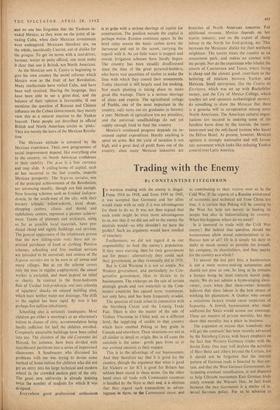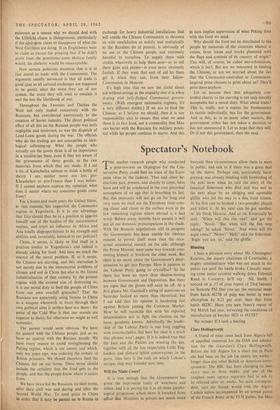Trading with the Enemy
By CONSTANTINE FITZGIBBON TN wartime trading with the enemy is illegal. 'From 1914 to 1918, and from 1939 to 1945, it was accepted that Germany and her allies would trade with us only if it was advantageous for them to do so. It was not then argued that such trade might be even more advantageous to us, nor that if we did not sell to the enemy the neutrals would—so why shouldn't we have the profits? Such an argument would have smelled of treachery.
Furthermore, we did not regard it as our responsibility to feed the enemy's population. If they were starving, then let their government sue for peace: alternatively they could sack their government, as they eventually did in 1918.
But in Cold Wartime it is not so simple. No Western government, and particularly no Con- servative government, likes to dictate to its businessmen. The embargo on the sale of certain strategic goods and raw materials to the Com- munist countries has caused some resentment, not only here, and has been frequently evaded.
The question of trade arises in connection with the Sternberg Circus and the Leipzig Trade Fair. There is also the matter of the sale of Vickers Viscounts to China and, on a different level, the supplying of credits to that country which have enabled Peking to buy grain in Canada and elsewhere. These situations are not at all similar in detail or origin. But in all cases the outcome is the same: goods pass from us to our avowed enemies at their request.
This is to the advantage of our businessmen. And they therefore say that it is good for the country, though the argument that what is good for Vickers or for ICI is good for Britain has seldom been stated in those terms. On the other hand since all trade with Communist countries is handled by the State at their end, it is obvious that they regard such transactions as advan- tageous to them, to the Communist cause, and as contributing to their victory over us in the Cold War. If the reports of a Russian withdrawal of economic and technical aid from China are true, it is certain that Peking will be coming to the West for help not merely in feeding its people but also in industrialising its country. When this happens, where do we stand?
Is it immoral to trade with the Cold War enemy? But behind that question, should the businessman allow moral considerations to in- fluence him at all? Or is it simply his duty to make as much money as possible for himself, his company, its shareholders, and thus maybe for the country as a whole?
To answer the last part first, a businessman is not a mere money-making automaton and should not pose as one. So long as he remains a human being he must exercise moral judg- ments. We do not admire a hymn-singing slave- owner, even when that slave-owner honestly believes that slave labour is the best means of working his plantation. A Quaker who owned a munitions factory would cause suspicions of hypocrisy.. A Jewish, businessman who made uniforms for Nazis would arouse our contempt. These are matters of private morality, but they show that morality has a place in business.
The argument or excuse that 'somebody else will get the contracts' has been recently advanced by the Sternberg Circus, with heavy emphasis on the fact that Western Germany trades with the Soviet Zone. One may well deplore the activities of Herr Beitz and others beyond the Curtain, but it should not be forgotten that the internal pattern of German trade is bisected by that cur- tain, and that the West German Government, an- ticipating eventual reunification, is not disposed to help Ulbricht reorientate East German trade solely towards the Warsaw bloc. In fact trade between the two Germanies is a matter of in- ternal German policy. For us to advance its existence as a reason why we should deal with the Ulbricht• clique is disingenuous, particularly if the apologists claim to disapprove of what the West Germans are doing If an Englishman were to claim as excuse for pimping that if he didn't profit from the prostitutes some Maltese family would, his dialectic would be unacceptable.
Now certain publicists maintain that it is in fact moral to trade with the Communists. The argument usually advanced is that all trade is good (just as all cultural exchanges are supposed to be good), since the more they see of our system, the more they will wish to emulate it and the less the likelihood of war.
Throughout the Twenties and Thirties the West not only traded extensively with the Russians, but contributed enormously to the creation of Soviet industry. The direct political effect of all this on the Russian people was both negligible and irrelevant, as was the dispatch of Lend-Lease goods during the war. The officials who do the trading are not susceptible to ideo- logical softening-up. What the people who actually use the goods think is of no importance in a totalitarian State, even if they are aware of the provenance of those goods, or the raw materials from which they are made. If I eat a tin of Kamchatka salmon or drink a bottle of sherry I am neither more nor less pro- Khrushchev or pro-Franco than I was before. If I cannot anyhow. express my opinions, what does it matter .where my consumer goods come from?
For a dozen and more years the United States, at vast expense,' has supported the Communist regime in Yugoslavia. Is it to our advantage that Tito should thus be in a position to appoint himself one of the leaders of the uncommitted nations, and exert an influence in Africa and Asia totally disproportionate.to his strength and abilities and, invariably, inimical to our policies?
China, it seems, is likely to find itself in .a position similar to Yugoslavia's and indeed is already asking for food. And here we, reach the essence of the moral problem. If, as it seems, the Chinese are starving, and this starvation is not merely due to the immemorial problems of climate and soil in China but also to the forced industrialisation of that country' by the present regime with the avowed aim of destroying us, is it our moral duty to feed the people of China from our own overfull granaries? That the Russians are apparently. using famine in China as a weapon wherewith to force through their own political aims is neither here nor there: the point of the 'Cold War is that our morals are superior to theirs, for otherwise we might as well surrender.
The answer 'would seem obvious. We have .no quarrel with the Chinese people, just as we have no quarrel with the Russian people. We have every reason to avoid strehgthening the , Peking regime, which is our enemy and which, only ten years ago, was ordering the torture of British prisoners. We should therefore feed the Chinese, but on our terms. These terms should include the certainty that the food gets to the people, and that the people know where it conies from.
We have twice fed the Russians, on their terms, after their civil war and during and after the Second World War. To send grain to China in order that it may be passed on to Russia in exchange for heavy industrial installations that will enable the Chinese Communists to threaten us with annihilation as noisily and realistically as the Russians do at present, is obviously of no use to the Chinese people and extremely harmful to ourselves. To supply them with credits wherewith to help them arm—or to sell them guns and planes—is even more obviously foolish. If they want that sort of aid let them get it, when they can, from their fellow- Communists in Moscow.
It's high time that we saw the cliche about aid-without-strings as the stupidity that it is when dealing with fully-fledged Communist govern- ments. (With emergent nationalist regimes, it's a very different Matter.) If we are to feed the Chinese, as 1 believe we should, then it is our responsibility also to ensure that what we send them is in fact food, not a commodity that Mao can barter with the Russians for military poten- tial while his people continue to starve. And this in turn implies supervision of what Peking does with the food we send.
Why should the food not be distributed to the people by nationals of the countries whence it comes, from trains and trucks plastered with the flags and symbols of its country of origin? This will, of course, be called neo-colonialism, which it isn't. But are we interested in feeding the Chinese, or are we worried about the lies that the Communist-controlled or Communist- inspired press chooses to print about us? They'll print them anyhow.
Let us assume then that adequately con- trolled charity to the starving is not only morally acceptable but a moral duty. What about trade? This is, really, not a matter for businessmen to decide individually, but for the government. And in this, as in so many other matters, the government either has not taken a decision or has not announced it. Let us hope that they will. Or if not this government, then the next.



































 Previous page
Previous page